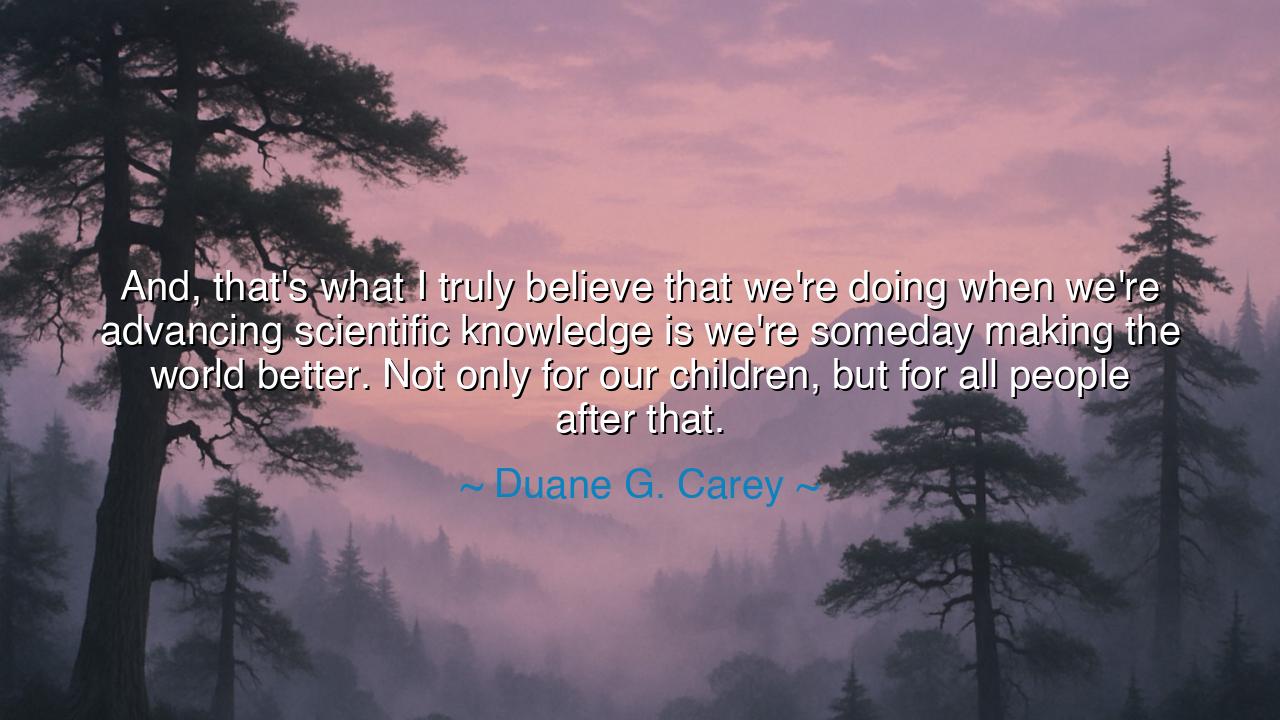
And, that's what I truly believe that we're doing when we're
And, that's what I truly believe that we're doing when we're advancing scientific knowledge is we're someday making the world better. Not only for our children, but for all people after that.






When Duane G. Carey, the American astronaut and Air Force pilot, said, “And, that’s what I truly believe that we’re doing when we’re advancing scientific knowledge is we’re someday making the world better. Not only for our children, but for all people after that,” he spoke with the quiet conviction of one who has gazed upon the Earth from beyond its atmosphere and understood how small—and yet how sacred—our world truly is. In this statement lies the voice of a man who has touched the stars but whose heart remains with humanity. His words are not just about science, but about legacy, responsibility, and the unbroken chain of progress that links every generation to the next.
The origin of this wisdom comes from Carey’s experience as a NASA astronaut, part of the lineage of explorers who dared to leave the safety of the Earth in pursuit of knowledge. In orbit, floating above continents and oceans, he would have seen what few have: the fragile unity of all life on one blue sphere. For him, the advancement of scientific knowledge was not merely an act of curiosity or ambition—it was an act of compassion. Every experiment, every mission, every discovery was a promise made to the future, a seed planted in the soil of time for those who would one day inherit this planet.
Carey’s words remind us that science is not cold or mechanical, as some imagine—it is deeply human. It is the bridge between wonder and wisdom, between imagination and reality. When a scientist peers into a microscope or gazes through a telescope, they are not just studying the world—they are caring for it. They are building tools, medicines, and technologies that will ease suffering and extend hope. The true scientist is a guardian of the future, much like the farmer who plants trees knowing he may never rest in their shade. Through their knowledge, they labor for the unborn generations who will walk the Earth long after their names have faded.
This ideal of selfless pursuit has echoed throughout history. Consider Louis Pasteur, who dedicated his life to understanding invisible microbes and thus unlocked the power of vaccines, saving millions who would never know his name. Or Galileo Galilei, who risked persecution to reveal the truth about the heavens, ensuring that future generations could see the universe not through superstition, but through reason and evidence. Each of these men, like Carey, believed in the sacred duty of knowledge—to serve humanity, not just the present, but the infinite procession of lives yet to come. They shared the conviction that the pursuit of understanding, when done with integrity, is one of the highest forms of love.
Yet Carey’s message also carries a warning. For science without purpose, or knowledge without morality, can wound as easily as it heals. The ancients knew this when they spoke of Prometheus, who brought fire to humankind—a symbol of knowledge and power. But that same fire, if wielded recklessly, could destroy what it was meant to illuminate. Thus, Carey’s statement is not only about progress but about stewardship. To make the world better for our children and all people after them requires not only discovery but wisdom—the wisdom to use what we learn in service of life, not domination.
The lesson for us, then, is profound yet practical. Each of us, in our own way, participates in the advancement of knowledge—whether through teaching, creating, questioning, or simply learning. Every moment spent in the pursuit of understanding adds a small light to the flame that humanity carries through the centuries. We must therefore approach knowledge with reverence and humility, asking always: Does this make the world better? Does this serve others as well as myself? For knowledge is not an end, but a tool—a means to lift humanity toward greater harmony, health, and hope.
Let us take Duane Carey’s words to heart as both inspiration and instruction. To advance scientific knowledge is to engage in a sacred act of faith—faith that what we learn today will protect and empower those who come tomorrow. It is to believe that every insight, every discovery, every small understanding is a gift that travels beyond our own lifetime. As the stars continue to burn and the Earth continues to turn, may we remember that the quest for knowledge is not about glory or gain, but about service—the service of making the world, as Carey said, better “not only for our children, but for all people after that.”
For in that truth lies the essence of all progress: that the hands which reach for the stars must also hold the Earth with love.






AAdministratorAdministrator
Welcome, honored guests. Please leave a comment, we will respond soon